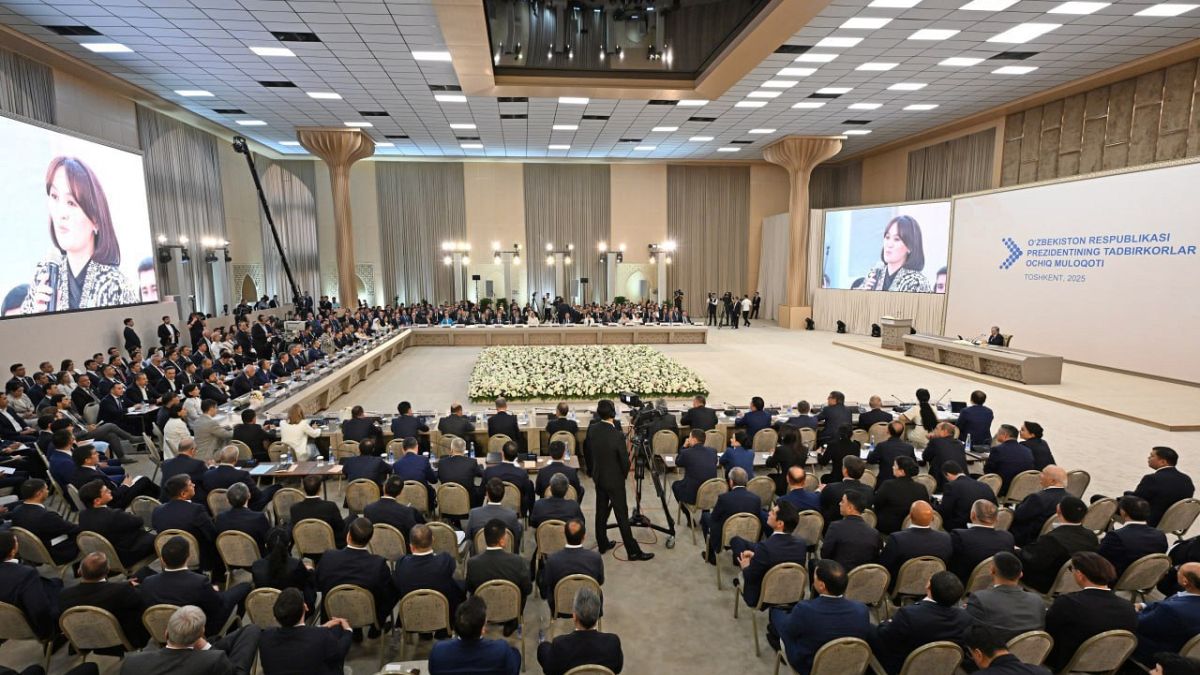By Rushana Aliakbarova
Published on
Uzbekistan marked its annual Entrepreneurs’ Day with an open dialogue between President Shavkat Mirziyoyev and business leaders, a tradition that has become a key platform for shaping the country’s economic policy.
The president congratulated entrepreneurs on their professional holiday and the 34th anniversary of independence, stressing their role in driving change “in every sector, every region, and every mahalla”.
New initiatives
Mirziyoyev outlined fresh measures to expand opportunities for business. He stressed that in the first half of this year, Uzbekistan’s economy grew by 7.2%, and over the past eight years, the country has attracted more than €197 billion of investment, with over half of that coming from overseas.
Support for start-ups and fintech is on the agenda for the next year. In just seven months, Uzbek start-ups attracted more than €240 million in foreign investment. A new “open banking” strategy and investment platform are expected to channel nearly €1.7bn annually into SMEs and innovation.
Tax procedures will be simplified: the threshold for advance income tax will double, and from 2026, entrepreneurs will be able to register a business, open a bank account and obtain a digital signature in just 15 minutes. A new Investment Code will unify rules and guarantees for investors.
In tourism, 5,000 hectares will be allocated for hotels and tourist facilities, with the state acting as a co-investor. In education, entrepreneurs in 80 districts with low preschool enrolment will receive incentives to build kindergartens and schools under public-private partnerships. Investors in medical clusters will be eligible for long-term loans at preferential rates.
Voices from business
For many entrepreneurs, the dialogue has become a unique opportunity to engage directly with the head of state.
Jamil Maksudi, director of business development at Oqsaroy Group, underlined the significance of the sector: “Textiles are one of Uzbekistan’s key industries. Over the past seven years we have tripled production, created more than 140 vertically integrated clusters and ensured jobs for nearly 600,000 people. Direct dialogue allows us to propose practical solutions — from improving logistics to expanding exports and promoting green technologies.”
Ulug’bek Rustamov, executive director of the digital payments company Click, stressed the role of fintech in the country’s transformation: “When we started in 2011, there was no law on payment systems. Thanks to reforms, we now operate with full legal recognition. More than 70,000 outlets accept Click payments, and nearly 21 million people use our system. That shows how central fintech has become for business and society”.
Tohir Sharipov, founder of ProCab, one of Central Asia’s largest cable producers, emphasised export ambitions: “We export to more than 50 countries, including the EU, the US and Canada. Last year we were named national export champions, and in 2025 we expanded further into European and North American markets. Since 2017 our output has grown more than tenfold — and this proves that Uzbek industry can compete globally.”
He added that success was possible thanks to improved investment conditions and logistics. “The dialogue with the president helps us address strategic challenges. With stable rules, access to infrastructure and strong international standards, companies like ours can keep strengthening Uzbekistan’s export potential”.
The deputy business ombudsman of Uzbekistan, Jamshid Urunov, underscored the strategic importance of entrepreneurship to national prosperity:
“The entrepreneurial movement in Uzbekistan has become an irreversible force. The richer our entrepreneurs are, the more prosperous our people will live, the more powerful our state will be. The success of an entrepreneur is the success of our entire nation.”
In his view, Entrepreneurs’ Day and the continuous dialogue platform help deepen this momentum of business-driven growth, turning ideas into legislation, attracting investment, and expanding exports.
Outlook
From textiles and fintech to cable manufacturing and tourism, entrepreneurs are increasingly seen as central to Uzbekistan’s growth model. With new reforms aimed at simplifying regulation, expanding finance and opening global markets, the government is betting on private initiative to drive innovation, jobs and competitiveness.

